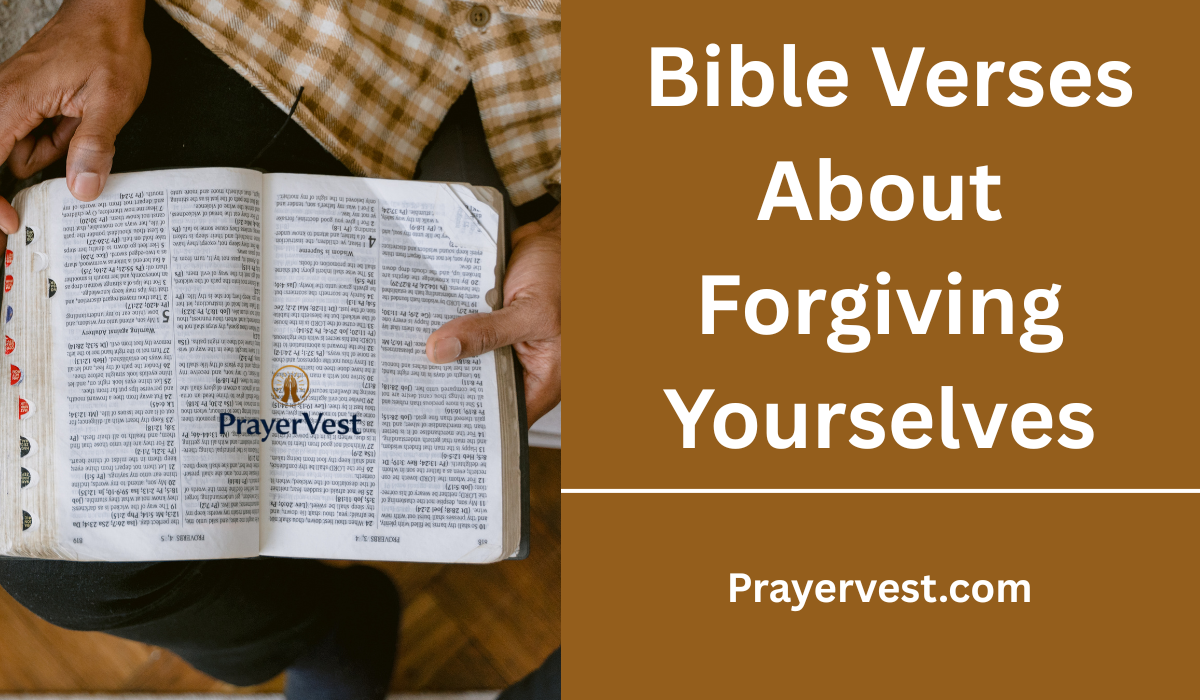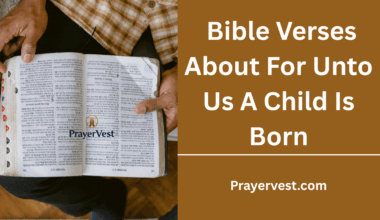It can be challenging to forgive others, but for many, forgiving oneself is the most challenging aspect of forgiveness. The Bible tells us that although God’s forgiveness through Christ is total, many people nevertheless experience regret, remorse, and shame years after receiving forgiveness.
Holding onto regrets from the past can be emotionally taxing and make it hard to feel free and at peace. Bible verses on forgiving oneself are crucial because they remind us that God’s grace is greater than our shortcomings and reassure us of His mercy.
Scripture teaches that when God pardons, He takes away our sins and no longer holds them against us, just as far as the east is from the west. However, people tend to practice their errors, which results in needless self-criticism.
The Bible addresses this conflict and exhorts believers to live in the freedom that Christ has purchased and to embrace God’s forgiveness. In addition to praising God’s boundless grace, these lines exhort us to embrace His love and healing and to free ourselves from the bonds of shame and guilt.


Examining Bible passages about self-forgiveness enables believers to see that self-forgiveness is about aligning with God’s truth rather than denying or justifying sin. We can advance in our faith and learn from our past while living in His grace if we accept His pardon. These verses remind us that God’s love restores and enables us to live fully in His purpose, offering consolation, healing, and direction to those who feel imprisoned by regret.
40 Powerful Bible Verses About Forgiving Yourselves (2026)
1. Psalm 103:12
“As far as the east is from the west, so far has he removed our transgressions from us.”
This verse beautifully portrays God’s infinite forgiveness, showing that once we are forgiven, our sins are separated from us completely. The distance between east and west is immeasurable, symbolizing that God does not hold our failures against us. When we struggle with forgiving ourselves, this passage reminds us that God has already wiped our slate clean.
2. Isaiah 1:18
“Though your sins are like scarlet, they shall be as white as snow; though they are red as crimson, they shall be like wool.”
God’s promise of cleansing demonstrates His willingness to restore us completely. Often, self-condemnation keeps us chained to guilt, but this verse shows that God transforms our stained past into purity. Forgiving ourselves begins with believing that God has made us new, removing every blemish through His mercy.
3. Romans 8:1
“Therefore, there is now no condemnation for those who are in Christ Jesus.”
This passage reminds us that guilt and shame have no authority over us once we are in Christ. Many people wrestle with forgiving themselves because they dwell in past mistakes, but Paul assures us that condemnation is erased through Christ. Learning to accept this truth helps us release self-blame and walk in freedom.
4. 2 Corinthians 5:17
“Therefore, if anyone is in Christ, the new creation has come: The old has gone, the new is here!”
This verse declares transformation. To forgive ourselves, we must recognize that God no longer defines us by our past. Through Christ, we are entirely new, with fresh identity and purpose. Embracing this reality allows us to let go of old guilt and live confidently in the grace of God.
5. Philippians 3:13-14
“Forgetting what is behind and straining toward what is ahead, I press on toward the goal to win the prize for which God has called me heavenward in Christ Jesus.”
Paul reminds us not to remain stuck in the past. Forgiving ourselves means choosing to release yesterday’s failures and keep moving forward with God’s plan. Dwelling on regrets only robs us of joy, but focusing on Christ’s calling allows us to walk in hope and purpose.
6. Micah 7:18-19
“You will again have compassion on us; you will tread our sins underfoot and hurl all our iniquities into the depths of the sea.”
God’s forgiveness is so thorough that He casts our sins into the depths of the sea. If God does not hold them against us, why should we? This verse encourages us to forgive ourselves by trusting in His complete pardon and infinite compassion.
7. 1 John 1:9
“If we confess our sins, he is faithful and just and will forgive us our sins and purify us from all unrighteousness.”
Forgiving yourself begins with believing God’s promise. Confession brings cleansing, not condemnation. Once God has purified us, we must stop replaying our failures and instead embrace His faithfulness to restore us completely.
8. Hebrews 8:12
“For I will forgive their wickedness and will remember their sins no more.”
God not only forgives but also chooses not to remember our sins. Self-forgiveness can feel difficult when memories linger, but this verse assures us that God has released them. His divine forgetfulness teaches us to let go of guilt and live in freedom.
9. Lamentations 3:22-23
“Because of the Lord’s great love we are not consumed, for his compassions never fail. They are new every morning; great is your faithfulness.”
Every day is a fresh start with God. His mercies renew our hearts and remind us not to be consumed by guilt or regret. Forgiving ourselves becomes possible when we embrace God’s daily supply of compassion and begin again in His love.
10. Ephesians 1:7
“In him we have redemption through his blood, the forgiveness of sins, in accordance with the riches of God’s grace.”
Redemption through Christ means our sins are fully paid for and forgiven. Self-condemnation has no place when the blood of Jesus has already secured our pardon. This verse reassures us that forgiveness is not about our worthiness but about God’s overflowing grace.
11. Colossians 3:13
“Bear with each other and forgive one another if any of you has a grievance against someone. Forgive as the Lord forgave you.”
This verse highlights the call to forgive others as Christ forgave us. Yet, it also challenges us to apply the same principle inwardly. If Christ’s forgiveness is sufficient for others, it is also sufficient for ourselves. Self-forgiveness is part of living out His grace fully.
12. Matthew 11:28-29
“Come to me, all you who are weary and burdened, and I will give you rest.”
Carrying guilt is a heavy burden. Jesus invites us to bring those weights to Him and receive rest. Forgiving ourselves becomes possible when we surrender our failures at His feet, trusting Him to replace guilt with peace.
13. 2 Corinthians 12:9
“My grace is sufficient for you, for my power is made perfect in weakness.”
Often, unforgiveness toward ourselves stems from disappointment in our weakness. This verse reminds us that God’s grace shines brightest in our flaws. Accepting His grace means embracing forgiveness, even when we feel undeserving.
14. Psalm 34:18
“The Lord is close to the brokenhearted and saves those who are crushed in spirit.”
When we struggle to forgive ourselves, our hearts can feel broken and crushed by regret. This verse reassures us that God draws near in those moments. His presence brings healing, allowing us to release self-condemnation.
15. John 8:36
“So if the Son sets you free, you will be free indeed.”
True freedom is found in Christ. If He has freed us from the bondage of sin and guilt, we no longer need to imprison ourselves in shame. Forgiving ourselves is part of living in the freedom Jesus has already secured.
16. Psalm 51:10
“Create in me a pure heart, O God, and renew a steadfast spirit within me.”
David’s prayer for cleansing reminds us that God can renew us completely. When we feel trapped by our mistakes, His Spirit restores purity and strength. This renewal gives us confidence to forgive ourselves and press forward.
17. Isaiah 43:25
“I, even I, am he who blots out your transgressions, for my own sake, and remembers your sins no more.”
God forgives us for His own sake, showing that forgiveness is rooted in His love, not our merit. If He chooses not to remember our sins, then holding on to self-condemnation is unnecessary. We are called to walk in His complete pardon.
18. James 5:16
“Therefore confess your sins to each other and pray for each other so that you may be healed. The prayer of a righteous person is powerful and effective.”
Self-forgiveness often comes through the healing process of confession and prayer. Sharing burdens with trusted believers allows God’s grace to work deeply in us. Healing begins when we stop hiding guilt and instead receive His forgiveness openly.
19. Romans 5:8
“But God demonstrates his own love for us in this: While we were still sinners, Christ died for us.”
This verse demonstrates that God’s love and forgiveness are unconditional. Christ didn’t wait until we were perfect to die for us. If God has already forgiven us at our worst, we can learn to extend the same grace to ourselves.
20. Jeremiah 31:34
“For I will forgive their wickedness and will remember their sins no more.”
God’s forgiveness is complete and final. When we refuse to forgive ourselves, we are remembering what God has already chosen to forget. This verse encourages us to align our thinking with His and embrace the freedom He offers.
21. Mark 11:25
“And when you stand praying, if you hold anything against anyone, forgive them, so that your Father in heaven may forgive you your sins.”
This verse speaks directly about extending forgiveness to others, but it also reveals an important truth: forgiveness is holistic. If we are commanded not to hold grudges against others, how much more should we avoid holding grudges against ourselves? Many believers struggle with self-condemnation, which creates barriers in their spiritual lives. By releasing ourselves from guilt, we open the way for unhindered prayer and deeper intimacy with God. Forgiving ourselves is not selfish—it is obedience to the principle of forgiveness that God designed to bring peace and restoration to our hearts.
22. 1 Peter 5:7
“Cast all your anxiety on him because he cares for you.”
Regret and guilt often manifest as anxiety, weighing us down and causing sleepless nights. Peter encourages us to cast *all* our cares on God, including the inner turmoil we carry from past mistakes. This verse shows that God doesn’t just care about our physical needs—He cares about our emotional and mental well-being too. Forgiving ourselves is an act of releasing anxiety into God’s hands, trusting His love to cover our failures. When we surrender guilt, we make room for His peace to flood our hearts and minds.
23. 2 Timothy 1:7
“For the Spirit God gave us does not make us timid, but gives us power, love and self-discipline.”
Self-forgiveness often requires courage because guilt breeds fear and shame. Yet, this verse reminds us that God has given us His Spirit, and His Spirit is not one of fear but of empowerment. Living in guilt keeps us timid and spiritually stagnant, but forgiving ourselves allows us to embrace God’s power, His love, and the discipline to walk in freedom. This passage calls us to reject self-condemnation and live boldly, knowing that God equips us to rise above our past mistakes.
24. Psalm 32:5
“Then I acknowledged my sin to you and did not cover up my iniquity. I said, ‘I will confess my transgressions to the Lord.’ And you forgave the guilt of my sin.”
David highlights the freedom that comes when we stop hiding our sins. Often, the inability to forgive ourselves is tied to shame that we keep locked inside. But the moment we confess to God, He forgives—not only the sin itself but also the guilt attached to it. This verse shows us that self-forgiveness is not about pretending mistakes didn’t happen, but about trusting God’s promise to remove the weight of guilt once we repent. Living with hidden guilt is exhausting; living in God’s forgiveness is liberating.
25. Galatians 5:1
“It is for freedom that Christ has set us free. Stand firm, then, and do not let yourselves be burdened again by a yoke of slavery.”
Paul teaches that Christ’s death and resurrection purchased our freedom. However, many Christians remain bound, not by sin itself, but by the guilt of past mistakes. This verse is a powerful call to stand firm in the liberty Christ has provided and refuse to be enslaved by self-condemnation. Forgiving ourselves means we refuse to reattach the chains that Jesus already broke. It is choosing to live as free people, no longer carrying the burden of yesterday’s failures into today’s blessings.
26. Matthew 6:14-15
“For if you forgive other people when they sin against you, your heavenly Father will also forgive you. But if you do not forgive others their sins, your Father will not forgive your sins.”
These verses emphasize the importance of forgiveness as a whole principle. While the immediate context is forgiving others, the principle extends inward as well. If we struggle to forgive ourselves, we may end up living in the same bondage as those who refuse to forgive others. The forgiveness we extend must flow in every direction—to others and to ourselves—so that we can live in the fullness of God’s mercy. This passage reminds us that forgiveness is not optional; it is central to living in harmony with God’s will.
27. Job 11:13-16
“Yet if you devote your heart to him and stretch out your hands to him… You will surely forget your trouble, recalling it only as waters gone by.”
Job’s story is filled with suffering and reflection, but in this verse, we see a promise of healing and restoration. Devotion to God leads to the kind of peace where past troubles fade like waves in the sea. For those struggling with self-forgiveness, this verse offers hope: the pain and regret you feel today will not always define you. As you give your heart fully to God, He enables you to forget past mistakes, not by erasing your memory but by replacing shame with peace and forward-looking faith.
28. Zephaniah 3:17
“The Lord your God is with you, the Mighty Warrior who saves. He will take great delight in you; in his love he will no longer rebuke you, but will rejoice over you with singing.”
This verse paints a beautiful picture of God’s love for His people. He not only forgives but also delights in us. Many people find it difficult to forgive themselves because they feel unworthy of love. Yet, here we see that God not only forgives but also rejoices over us. Self-forgiveness becomes possible when we stop viewing ourselves through the lens of failure and instead through the lens of God’s delight and love. His joy over us is greater than our regret.
29. Hebrews 10:17
“Their sins and lawless acts I will remember no more.”
This passage echoes God’s covenant of grace and finality of forgiveness. Once forgiven, our sins are not only removed but also forgotten. When we hold on to guilt, we are remembering what God Himself has erased. Forgiving ourselves means aligning our thoughts with God’s truth—choosing not to dwell on what He has already buried. This verse is a clear reminder that forgiveness is not partial or temporary but complete and everlasting.
30. Psalm 147:3
“He heals the brokenhearted and binds up their wounds.”
Guilt often leaves deep wounds in the heart. This verse assures us that God is not only a forgiver but also a healer. Forgiving ourselves is part of the healing journey He desires for us. Just as He binds up physical wounds, He also binds up emotional and spiritual wounds caused by regret and self-condemnation. Through His love, the scars of guilt are replaced with the comfort of restoration and the strength to live anew.
31. John 3:17
“For God did not send his Son into the world to condemn the world, but to save the world through him.”
Many believers live in self-condemnation, forgetting that Jesus did not come to condemn but to save. This verse shifts our focus from guilt to salvation. If Christ’s mission was to save us, then continually condemning ourselves undermines His work. Forgiving ourselves is part of embracing His purpose: freedom, healing, and new life in Him. When we let go of condemnation, we fully accept the salvation Christ provides.
32. Psalm 86:5
“You, Lord, are forgiving and good, abounding in love to all who call to you.”
This verse captures the heart of God’s character: forgiveness and abundant love. When we call on Him, He responds with mercy. Often, the inability to forgive ourselves comes from misunderstanding who God is. He does not delight in punishing us but delights in extending love. By recognizing His goodness, we can release self-hatred and walk in His forgiveness.
33. Romans 6:6
“For we know that our old self was crucified with him so that the body ruled by sin might be done away with, that we should no longer be slaves to sin.”
The old self—the one riddled with mistakes and guilt—was crucified with Christ. This truth means our failures no longer define us. Self-forgiveness becomes possible when we understand that our sinful past was nailed to the cross. We are no longer slaves to guilt or shame; we are free to live as new creations, unbound by the past.
34. Ephesians 4:31-32
“Get rid of all bitterness, rage and anger, brawling and slander, along with every form of malice. Be kind and compassionate to one another, forgiving each other, just as in Christ God forgave you.”
Forgiveness is rooted in kindness and compassion, and that includes being kind to ourselves. Bitterness doesn’t always target others—sometimes it’s directed inwardly. This passage reminds us that forgiveness should mirror God’s mercy in Christ. Just as He forgave us, we must extend forgiveness inward, showing ourselves compassion instead of bitterness and anger.
35. Psalm 25:7
“Do not remember the sins of my youth and my rebellious ways; according to your love remember me, for you, Lord, are good.”
David’s prayer reflects the longing many of us feel when haunted by past mistakes. He appeals to God’s love and goodness rather than his own merit. This verse teaches us that God’s memory of us is filtered through His love, not through our past. When we struggle to forgive ourselves, we can rest in knowing that God remembers us with mercy, not condemnation.
36. Isaiah 55:7
“Let the wicked forsake their ways and the unrighteous their thoughts. Let them turn to the Lord, and he will have mercy on them, and to our God, for he will freely pardon.”
This verse underscores the generosity of God’s pardon. His forgiveness is not reluctant—it is free and abundant. When we find it difficult to forgive ourselves, we must remember that God does not forgive sparingly but lavishly. Turning to Him means receiving mercy that is greater than our regrets, freeing us to release ourselves as well.
37. Matthew 5:4
“Blessed are those who mourn, for they will be comforted.”
Sometimes, forgiving ourselves begins with mourning the wrong we’ve done. Jesus assures us that this mourning is not in vain—it leads to comfort. God does not leave us in grief over our mistakes; He meets us with comfort that allows healing and self-forgiveness. This verse shows that even sorrow over sin can be transformed into blessing when it draws us closer to God’s mercy.
38. Titus 3:5
“He saved us, not because of righteous things we had done, but because of his mercy. He saved us through the washing of rebirth and renewal by the Holy Spirit.”
Self-forgiveness can feel impossible when we measure ourselves by what we have or haven’t done. But this verse shifts the focus: salvation and forgiveness come not through our righteousness but through God’s mercy. The Holy Spirit renews us completely, washing away guilt and giving us a fresh start. Accepting this truth enables us to forgive ourselves, knowing it is God’s mercy, not our efforts, that defines us.
39. Nehemiah 9:17
“But you are a forgiving God, gracious and compassionate, slow to anger and abounding in love. Therefore you did not desert them.”
This verse reflects God’s character through Israel’s history: forgiving, gracious, and steadfast in love. Even when His people strayed, He never abandoned them. In the same way, God does not desert us in our failures. Self-forgiveness becomes easier when we remember that God is patient with us, slow to anger, and overflowing with love that refuses to let us go.
40. Revelation 21:4
“He will wipe every tear from their eyes. There will be no more death or mourning or crying or pain, for the old order of things has passed away.”
The ultimate hope for those struggling with self-forgiveness is found in this promise. One day, God will wipe away every tear, and the pains of regret will vanish forever. The “old order”—including sin, shame, and guilt—will be gone. This vision of eternity gives us courage to start living in forgiveness now, knowing that God’s plan for us is freedom, healing, and everlasting peace.
Conclusion
Finally, the Bible’s teachings on self-forgiveness serve as a reminder that God’s forgiveness surpasses our own regrets, transgressions, and failures. Scripture reminds us that after we repent, God cleanses us and no longer holds our crimes against us, even though it may be hard to let go of the guilt we harbor. Instead of being held back by guilt or self-condemnation, accepting His kindness enables us to proceed in freedom. To forgive oneself is to accept God’s grace and make the decision to live in His truth, not to deny what has happened.
Self-forgiveness is ultimately an act of faith—having faith that everything that Christ did on the cross is sufficient to atone for all of his shortcomings. Believers are urged to replace self-deprecation with thankfulness, humility, and a fresh sense of strength in God’s love by considering these verses. Healing, peace, and the capacity to fulfill your mission with faith in God’s constant love are all made possible when you forgive yourself and let go of your guilt.






